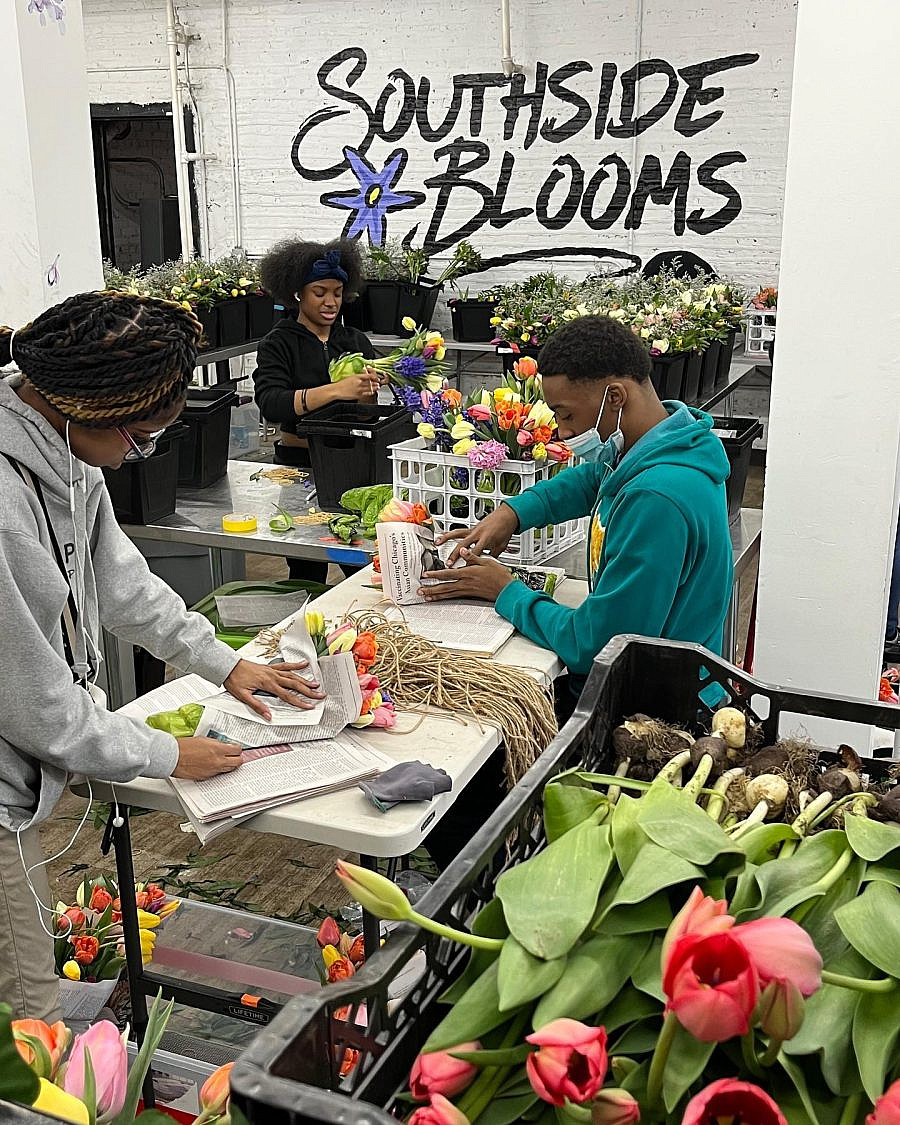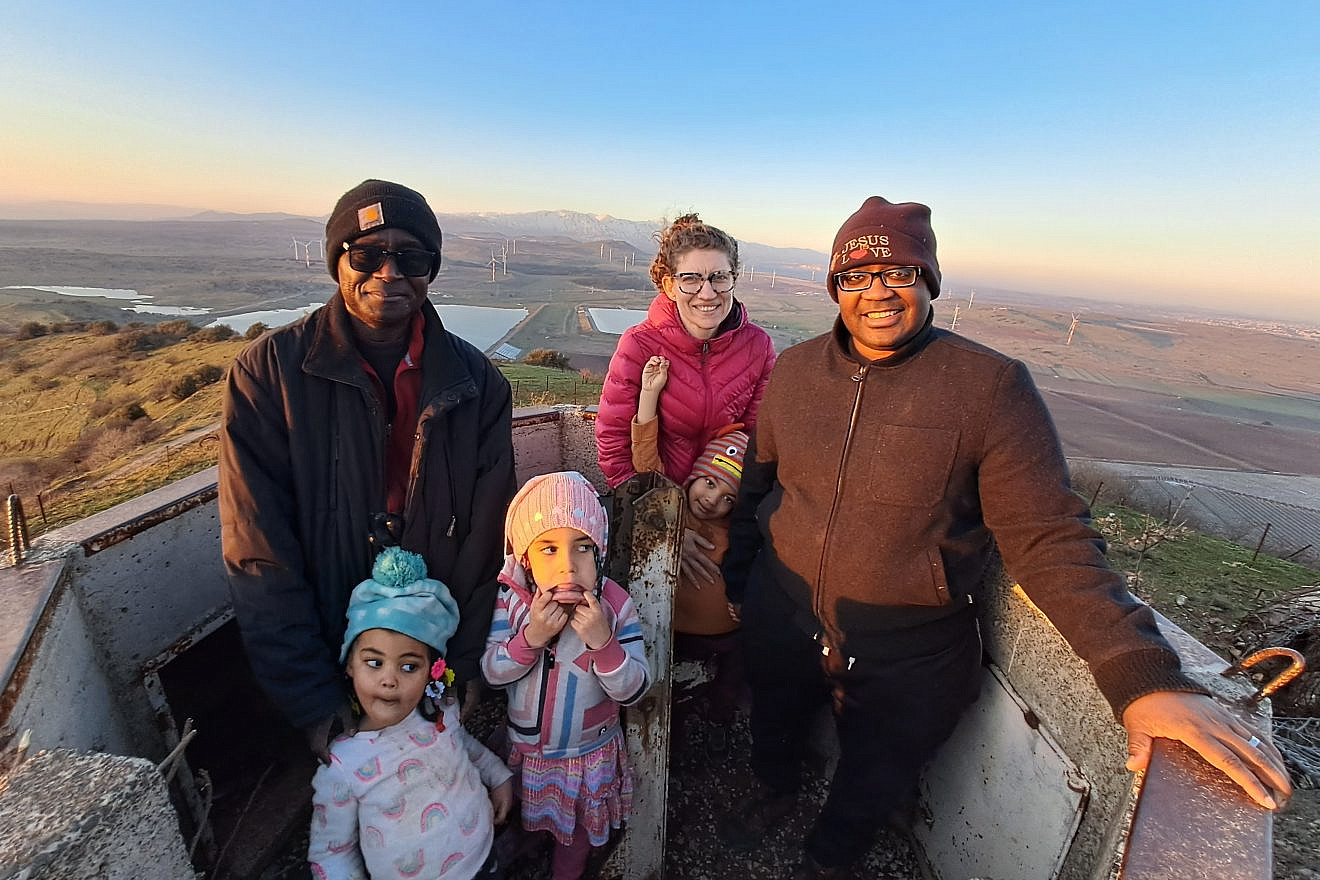Quilen Blackwell, a Madison, Wisc. native who became a born-again Christian at 18, took an interest in Israel and all things biblical as a University of Wisconsin-Madison student. Blackwell, now 38, participated in Hillel events on campus, which marked his first relationships with Jews.
But when he received an email from the Consulate General of Israel in the Midwest in 2021—the year after he opened a flower shop in Chicago—Blackwell assumed it was spam. It turned out that the consulate, which had been researching Chicagoland sustainable organizations, found him in a Google search.
“Quilen is a passionate business and social entrepreneur, who has managed to create an amazing impact within the community of Englewood,” Yinam Cohen, consul general of Israel to the Midwest, told JNS. “One of my major goals as the consul general of Israel is to enhance our partnership with communities in Chicago’s South and West sides. The minute I heard about what Quilen does, I knew that he was exactly the kind of partner I was looking for.”
The consulate invited Blackwell and his wife, three children and father on a weeklong trip to Israel. It chipped in about $5,000 toward flights and training at the Jerusalem Botanical Gardens, while the Blackwells covered their own lodging and food and transportation within Israel. Having never been to the Jewish State before, he accepted.
“I was absolutely ecstatic. For me, going to Israel really felt more like a spiritual pilgrimage,” Blackwell told JNS.
Desert bloom
In Israel, Blackwell and his family visited sites that Christians hold sacred, including Nazareth, the Galilee, Capernaum and Jerusalem’s old city. But this was also a business trip.
At the Jerusalem Botanical Gardens, Blackwell learned from a Jerusalem florist how to make wedding chuppahs (canopies), certain Israeli bouquets and centerpieces and international European designs. Throughout the trip, he was impressed by Israel’s agricultural prowess.
“The fact that they’re growing flowers and all these other things in the desert with water-efficient technology is just amazing,” Blackwell said.
An urban ‘garden of Eden’
Southside Blooms on South Morgan Street in Chicago doesn’t look like much on the outside. The median real estate price in the neighborhood is less expensive than 75.7% of Illinois neighborhoods, and it is one of the 15.4% least expensive in the nation, according to the database NeighborhoodScout.
But the flower shop is already making a difference in the neighborhood, according to Blackwell, who told JNS that he employs more than a dozen young Black Chicagoans, who come from high-risk backgrounds.
Working for Southside Blooms is a refuge from deep poverty and gang and domestic violence, with which the young people deal daily, according to Blackwell. “This is like their Garden of Eden,” he said.
Blackwell thinks his nonprofit—which has been spotlighted on NBC’s “Today” Show and “The Ellen Show,” which surprised him with a giant $10,000 check—affords the young people a rare opportunity to engage with society more broadly and to be part of an industry with upward mobility.
“It is not only a safe space amidst desolation, but they can have a bigger platform to showcase their value,” he said.
Rooted in faith
As a new Christian in college, Blackwell was figuring out his faith. “I was reading the stories about Noah, Abraham, Isaac, Jacob and Joseph,” he told JNS. “It just got me thinking more about Israel in an historical context.”
He came to see the modern State of Israel, the revival of Hebrew and the ingathering of Jews from the diaspora as a miracle.
The flourishing of the Jewish State and its growth in a premier world economy inspires Blackwell’s work in one of the poorest and most dangerous parts of Chicago.
“Especially when looking at my work in the hood, I find a lot of inspiration that maybe one day we can replicate that here,” Blackwell said.
He came to Chicago in 2011 following a Peace Corps stint in Thailand, where he learned about business sustainability in an organic fertilizer co-op, and a role as an affordable housing community organizer in Milwaukee.
In the Windy City, he studied at Living Word Christian Center, a megachurch, and volunteered tutoring math and English at an Englewood high school, which has since closed. In 2014, he and his wife Hannah co-founded the nonprofit Chicago Eco House, a series of urban flower farms in the Woodlawn, West Garfield Park, Washington Park and Englewood neighborhoods—as well as one in Detroit.

“Our mission was to use sustainability to alleviate poverty. So we began by acquiring vacant lots, while thinking about what we could grow here as a cash crop,” Blackwell said. After some experimentation, they settled on flowers.
Some 80% of flowers purchased stateside are imported, according to Blackwell, who saw an opportunity for his local community to keep more of its money close to home. He also appreciates flowers as symbols.
“It’s very disarming,” he said. “You can have people from very different backgrounds not agree on much. But when you see the beauty of flowers, it’s very hard for these people to come in with this hardened perspective.”
There’s a need for softer perspectives both in Englewood and in Israel, according to Blackwell. Outsiders see both as desolate wastelands, he believes, but just as Israel literally caused the desert to bloom, he is optimistic about his neighborhood.
“If it can happen in Israel, where frankly the challenges they face are far bigger than the challenges we face here, then why can’t we do the same?” he said. (He told JNS Israel and its Midwest consulate have supported him far more than local politicians have.)
He thinks average Jews and Black people in Chicago can get along and find much in common. And he thinks Israel is important to many Black people.
“Our youth love the fact that we have a partnership with the Israeli consulate,” he said.
Blackwell told JNS that Southside Blooms provided flowers for the consulate’s 74th Israeli anniversary celebration last year, and the 75th this year. And recommendations from the consulate has brought in business for Jewish weddings and at synagogue events.
“When you’re working in a place like Englewood—where you don’t have a lot of opportunities—when someone comes and shows that they care and that they’re willing to create an opportunity, that means the absolute world to you,” he said.

























